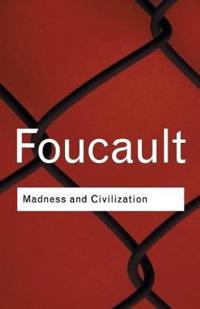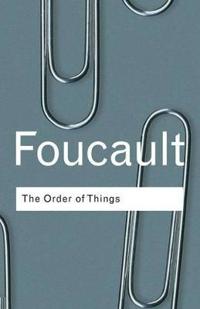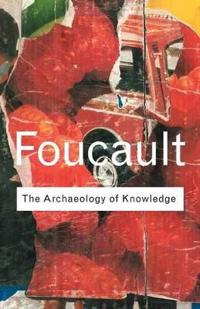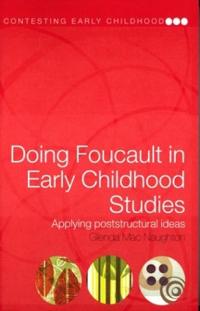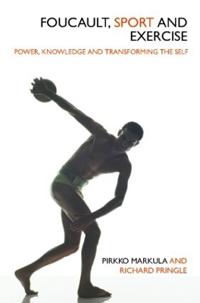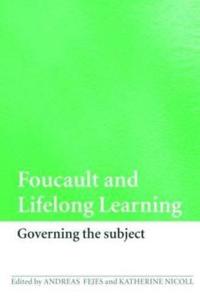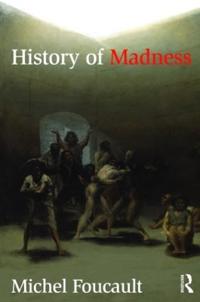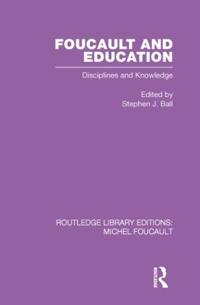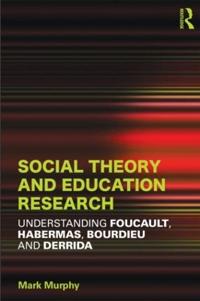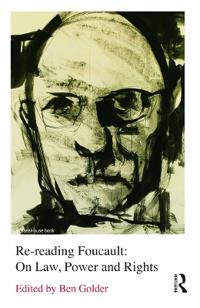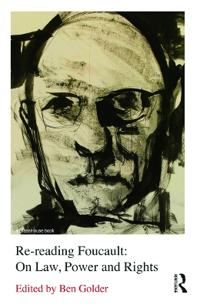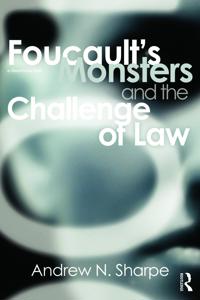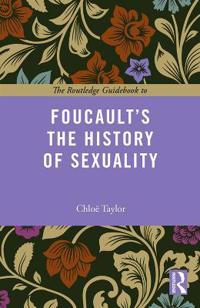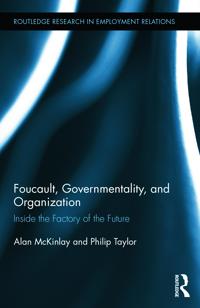Michel Foucault (Häftad)
avSara Mills
ISBN: 9780415245692 - UTGIVEN: 200305It is impossible to imagine contemporary critical theory without the work of Michel Foucault. His radical reworkings of the concepts of power, knowledge, discourse and identity have influenced the widest possible range of theories and impacted upon disciplinary fields from literary studies to anthro[...]
Madness and Civilization (Häftad)
avMichel Foucault
ISBN: 9780415253857 - UTGIVEN: 200105In this classic account of madness, Michel Foucault shows once and for all why he is one of the most distinguished European philosophers since the end of World War II. Madness and Civilization, Foucault's first book and his finest accomplishment, will change the way in which you think about society.[...]
The Order of Things (Häftad)
avMichel Foucault
ISBN: 9780415267373 - UTGIVEN: 200110When one defines "order" as a sorting of priorities, it becomes beautifully clear as to what Foucault is doing here. With virtuoso showmanship, he weaves an intensely complex history of thought. He dips into literature, art, economics and even biology in The Order of Things, possibly one of the most[...]
Michel Foucault (Häftad)
avBarry Smart
ISBN: 9780415285339 - UTGIVEN: 200210In investigating the major works of Michel Foucault, Barry Smart focuses on the analysis of the relations of power and knowledge and modes of objectification through which human beings are made subjects; and addresses controversial issues concerning the state and resistance to power. The development[...]
Archaeology of Knowledge (Häftad)
avMichel Foucault
ISBN: 9780415287531 - UTGIVEN: 200205In France, a country that awards its intellectuals the status other countries give their rock stars, Michel Foucault was part of a glittering generation of thinkers, one which also included Sartre, de Beauvoir and Deleuze. One of the great intellectual heroes of the twentieth century, Foucault was a[...]
The Birth of the Clinic (Häftad)
avMichel Foucault
ISBN: 9780415307727 - UTGIVEN: 200304In this remarkable book Michel Foucault, one of the most influential thinkers of recent times, calls us to look critically at specific historical events in order to uncover new layers of significance. In doing so, he challenges our assumptions not only about history, but also about the nature of lan[...]
Doing Foucault in Early Childhood Studies (Storpocket)
avGlenda McNaughton
ISBN: 9780415321006 - UTGIVEN: 200504The theories and analyses of post-structural thinkers such as Michel Foucault can seem a long way from practice in early childhood services. In recent years, however, many early childhood researchers and practitioners have found this work important, and this fascinating book brings together a range [...]
Foucault, Sport and Exercise (Storpocket)
avPirkko Markula-Denison, Richard Pringle
ISBN: 9780415358637 - UTGIVEN: 200609Michel Foucault's work profoundly influences the way we think about society, in particular how we understand social power, the self, and the body. This book gives an innovative and entirely new analysis of is later works making it a one-stop guide for students, exploring how Foucauldian theory can i[...]
Foucault and Lifelong Learning (Storpocket)
ISBN: 9780415424035 - UTGIVEN: 200801Over the last twenty years there has been increasing interest in the work of Michel Foucault in the social sciences and in particular with relation to education. This, the first book to draw on his work to consider lifelong learning, explores the significance of policies and practices of lifelong le[...]
Foucault's Law (Pocket)
avBen Golder, Peter Fitzpatrick
ISBN: 9780415424547 - UTGIVEN: 2009-02-26Addresses the question of Foucault's position on law. This title shows how Foucault outlines a concept of law which is not tied to any given form or subordinated to a particular source of power, but is critically oriented towards alterity, possibilities and different ways of being.[...]
History of Madness (Storpocket)
avMichel Foucault
ISBN: 9780415477260 - UTGIVEN: 200903When it was first published in France in 1961 as Folie et Deraison: Histoire de la Folie a l'age Classique, few had heard of a thirty-four year old philosopher by the name of Michel Foucault. By the time an abridged English edition was published in 1967 as Madness and Civilization, Michel Foucault h[...]
Foucault & The Politics Of Hearing (Inbunden)
avLauri Siisiainen
ISBN: 9780415519267 - UTGIVEN: 2012-07-18Foucault and Education (Häftad)
ISBN: 9780415521581 - UTGIVEN: 201202First published in 1990, this book was the first to explore Foucault's work in relation to education, arguing that schools, like prisons and asylums, are institutions of moral and social regulation, complex technologies of disciplinary control where power and knowledge are crucial. Original and chal[...]
Social Theory and Education Research: Understanding Foucault, Habermas Bourdieu and Derrida (Häftad)
ISBN: 9780415530149 - UTGIVEN: 201303Although education researchers have drawn on the work of a wide diversity of theorists, a number of these have been of particular significance to education. While the likes of Karl Marx, Antonio Gramsci, John Dewey and Paulo Freire influenced previous generations of educational theorists, much of th[...]
Educational Leadership and Michel Foucault (Inbunden)
avDonald Gillies
ISBN: 9780415633123 - UTGIVEN: 201305Drawing from the ideas of Michel Foucault, this book offers a critical examination of today's dominant discourse of educational leadership. Foucault's understanding of critique is as a 'permanent' ethos in which humans explore the nature of their existence but at the same time query the limits impos[...]
Re-reading Foucault (Pocket)
avBen (EDT) Golder
ISBN: 9780415634137 - UTGIVEN: 2014-03Re-reading Foucault: On Law, Power and Rights is the first collection in English fully to address the relevance of Michel Foucault's thought for law. Foucault is the best known and most cited of the late twentieth-century's 'theory' academics. His work continues to animate a range of different cri[...]
Re-reading Foucault: On Law, Power and Rights (Inbunden)
ISBN: 9780415673532 - UTGIVEN: 201106Re-reading Foucault: On Law, Power and Rights is the first collection in English fully to address the relevance of Michel Foucault's thought for law. Foucault is the best known and most cited of the late twentieth-century's 'theory' academics. His work continues to animate a range of different cri[...]
Foucault's Monsters and the Challenge of Law
ISBN: 9780415685719 - UTGIVEN: 2011-07In contrast to other figures generated within social theory for thinking about outsiders, such as Rene Girard's 'scapegoat' and Zygmunt Bauman's 'stranger', Foucault's Monsters and the Challenge of Law suggests that the figure of 'the monster' offers greater analytical precision and explanatory powe[...]
Foucault For Architects (Inbunden)
avGordana Fontana-giusti
ISBN: 9780415693301 - UTGIVEN: 2013-05-17"Offering an excellent entry point into the remarkable work of Michel Foucault, this book provides a focused overture suitable for architects, designers, urban designers, students of architectural design and related histories and theories. Michel Foucault has had a significant impact on various aspe[...]
Foucault for Architects (Häftad)
avGordana Fontana-Giusti
ISBN: 9780415693318 - UTGIVEN: 201305From the mid-1960s onwards Michel Foucault has had a significant impact on diverse aspects of culture, knowledge and arts including architecture and its critical discourse. The implications for architecture have been wide-ranging. His archaeological and genealogical approaches to knowledge have tran[...]
The Routledge Guidebook to Foucault's the History of Sexuality (häftad)
ISBN: 9780415717847 - UTGIVEN: 2016-10Michel Foucault's The History of Sexuality is one of the most influential philosophical works of the twentieth century and has been instrumental in shaping the study of Gender, Feminist Theory and Queer Theory. But Foucault's writing can be a difficult book to grasp as Foucault assumes a familiarity[...]
Foucault, Governmentality, and Organization
ISBN: 9780415749053 - UTGIVEN: 2014-02This book traces how abstract managerial ideas about maximizing production flexibility and employee freedom were translated into concrete, day-to-day practices at the Motorola plant in East Kilbride, UK. Using eyewitness accounts, the book describes how employees dealt with the increased freedom Mot[...]
Kant, Foucault, and Forms of Experience
ISBN: 9780415807937 - UTGIVEN: 2011-12This study presents the theoretical apparatus of Foucault's early historical analyses as a version of Kantian criticism. In an initial textual exposition, the author attempts to distill a unified discursive practice from Kant's theoretical writings, arguing for Foucault's proximity to Kant on the ba[...]
Foucault and a Politics of Confession in Education (Inbunden)
avAndreas Fejes
ISBN: 9780415833806 - UTGIVEN: 2014-07In liberal, democratic and capitalist societies today, we are increasingly invited to disclose our innermost thoughts to others. We are asked to turn our gaze inwards, scrutinizing ourselves, our behaviours and beliefs, while talking and writing about ourselves in these terms. This form of disclosur[...]
Foucault and a Politics of Confession in Education (Häftad)
avAndreas Fejes
ISBN: 9780415833813 - UTGIVEN: 2014-07In liberal, democratic and capitalist societies today, we are increasingly invited to disclose our innermost thoughts to others. We are asked to turn our gaze inwards, scrutinizing ourselves, our behaviours and beliefs, while talking and writing about ourselves in these terms. This form of disclosur[...]


